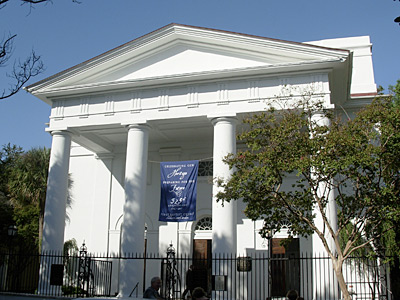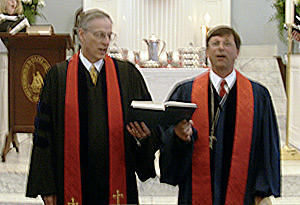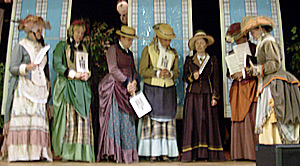Three hundred and eleven years ago, William Screven and 28 others from a 14-year-old congregation in Kittery, Maine, set sail for Charleston in search of religious freedom. On Sept. 30, members of the earliest Baptist church in the South officially celebrated their 325-year heritage that includes the founding of a Baptist association, a university and a seminary, and the start of the first national Baptist convention.
 Completed in 1822, the sanctuary of First Baptist Church holds the distinction of being designed by the first American-born architect, Robert Mills.
Completed in 1822, the sanctuary of First Baptist Church holds the distinction of being designed by the first American-born architect, Robert Mills.“You are the mother of all of us who grew up Baptist in the South,” declared anniversary keynote speaker Thomas McKibbens, a direct descendant of Basil Manly, who served as pastor of First Baptist Church, Charleston, from 1826 to 1837.
McKibbens was part of a bevy of Baptist speakers to commemorate the anniversary during the past few weeks, including Morris Chapman, president of the Southern Baptist Convention’s Executive Committee; Paul Craven Jr., former pastor of First Baptist Church; and Albert Mohler, president of Southern Baptist Seminary.
A Baptist historian and pastor of First Baptist Church, Worchester, Mass., McKibbens compared the Charleston congregation to a ship tossed on a stormy sea, but still plowing ahead through the waves.
“An ancient practice of ships was to fly three flags,” McKibbens observed. “On the main mast was the flag of the owner of the ship. On the stern mast was the flag of the country of origin. On the fore mast was the flag of the country of destination,” he explained.
“First Baptist Church, Charleston, bears such flags,” he continued. “You have a main mast, flying the flag of Christ, under whose name you have now sailed for 325 years. You have a stern mast, bearing the flag of New England, the country from which you came. You have a fore mast, flying the flag of eternity toward which you travel.”
 McKibbens, left, a Massachusetts pastor, was keynote speaker for the Sept. 30 service.
McKibbens, left, a Massachusetts pastor, was keynote speaker for the Sept. 30 service.McKibbens highlighted the fact that the Charleston congregation was non-conformist and theologically diverse from the beginning, fleeing from persecution and Puritan orthodoxy.
“These people left a New England that was dominated by a Puritan hierarchy which absolutely demanded conformity of theological belief. The people had been persecuted by people who thought they had all the right theological answers,” he reminded the Charleston congregation.
“I am always suspicious when anyone claims to have all the truth and is bent on excluding others,” McKibbens said. “My Baptist genes begin to stand up and say, ‘Wait a minute, Baptists have always been diverse theologically.’
“When religion becomes judgmental, when religion becomes legalistic, when religion becomes narrow and exclusionary, when religion becomes manipulative, that person of the Christian faith should not claim the name Baptist,” he declared.
McKibbens exhorted Charleston First to be a world church that listens and provides a safe place for people who are diverse, while deepening its knowledge and convictions of its own faith tradition.
“The church is the one institution that transcends all the political, cultural and racial barriers that we fall down and worship sometimes,” he said. “You, my friends, are a world church because you still teach your children to sing, ‘Jesus loves the little children, all the children of the world; Red and yellow, black and white, they are precious in his sight.’ “
By 1696, William Screven arrived in Charleston, where he and 28 others would establish First Baptist Church, but the congregation traces its origin back to the church in Kittery, Maine, that was founded in 1682. A brief survey of Baptist history reveals the significant role that First Church has played in the formation of the Southern Baptist denomination.
 Women of the church, dressed in period attire, were part of a “windows on the past” vignette, following a luncheon in the church’s gym.
Women of the church, dressed in period attire, were part of a “windows on the past” vignette, following a luncheon in the church’s gym.In 1751, pastor Oliver Hart, a minister from Philadelphia who moved to Charleston, helped form the Charleston Baptist Association, the oldest Baptist association in the South. The association began missions work to pioneer settlements and to Indians and began a fund for educating ministers.
In 1814, pastor Richard Furman, a strong advocate of Christian education, was named the first president of the Triennial Convention. The first national Baptist convention would serve as a model for the Southern Baptist Convention.
In 1826, First Baptist and the Charleston Baptist Association helped lead South Carolina Baptists to found Furman University, from which Southern Baptist Seminary was established in 1859. Pastor Basil Manly Sr. played a major role in establishing the seminary.
Marshall Blalock, current pastor, notes that First Baptist is still a missions-minded congregation, sending missions volunteers to Romania, Peru, the Middle East, Ethiopia, Kyrgyzstan and Japan. And, as a part of its 325th anniversary celebration, the oldest Baptist church in the South signed a covenant to start a new Baptist church in the West Ashley area of Charleston, Blalock said.
